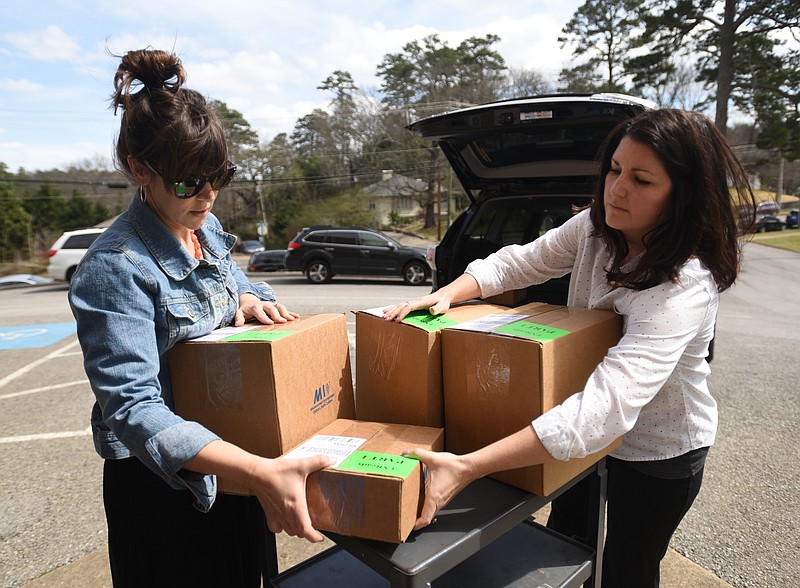Timeline:
August 2015: The school board is first told specifics about TNReadySeptember 2015: Education Commissioner Candice McQueen comes to Hamilton County to meet with principals upset about the new assessment.October 1, 2015: Hamilton County schools participate in the state’s trial-run of the online testing platform.November 2015: High schools on block schedules take the first portion of TNReady online, and principals speak out against the amount of increased testing time.Feb. 6, 2016: More than 1oo families in Hamilton County tell school officials they plan to opt their children out of TNReady.February 8, 2016: Spring testing is scheduled to begin online, but the online testing platform experiences significant glitches forcing the state to delay testing and return to paper and pencil assessments.February 10, 2016: Hamilton County’s Principal Association drafts a letter asking that TNReady results not be used in evaluations.February 17, 2016: Gov. Bill Haslam announces that TNReady scores do not have to be used in teachers’ evaluations, and the Hamilton County school board passes a resolution not to include the scores.March 4, 2016: Hamilton County school officials delay testing because TNReady paper and pencil tests did not arrive on time.March 10, 2016 : TNReady paper and pencil tests arrive in Hamilton County.March 14, 2016: Hamilton County schools start administering the paper and pencil TNReady assessment.Source: Times Free Press archives
The inaugural year of TNReady could have been scripted.
The technical issues. The outraged educators. The chaos.
"I don't know what people were expecting," said Gregory Cizek, who specializes in testing policy. "If they weren't expecting some bugginess, they are crazy."
Cizek, professor of educational measurement and evaluation at the University of North Carolina at Chapel Hill, said it is common for states to experience setbacks when switching tests - especially if they are taking the leap from paper and pencil to digital assessments. But he said these setbacks should not prevent Tennessee from moving forward with TNReady and using its results for accountability.
Even so, educators in Hamilton County remain frustrated about TNReady, which is replacing TCAP, and they say this year's results are unreliable.
Moving forward, educators say they want standardized testing to change.
Upset over TNReady began for many last year as word started to circulate about the new two-part assessment that would be administered over six or seven weeks rather than four or five sequential days as in previous years. Though actual testing time did not drastically increase - and decreased for some students - critics say preparation time and the need to rearrange weeks of school schedules robbed students of valuable instructional time.
The online testing platform was canned last month after major glitches occurred on the first day of spring testing. The state announced Feb. 8 that districts would return to paper and pencil tests this year. State officials said the print version of TNReady was created alongside the online one and also will test student comprehension of material and not just fact memorization.
But printing the tests further delayed testing, causing principals and teachers to rearrange schedules yet again.
More than 100 families in Hamilton County told school officials they wanted to opt their children out of testing, but state law says students are required to take the test. The district could not allow them to opt out, so students have had to turn down the pages when they are distributed and wait quietly at their desks while classmates work the test.
Tennessee Education Commissioner Candice McQueen said she is sympathetic to everyone's frustration and knew this year would be a significant transition for all public schools.
McQueen said that's why she supports the state offer of flexibility to teachers, schools and districts this year on accountability, and she is looking ahead to ways to improve testing next year.
Part of teachers' and schools' annual evaluations is based on standardized test scores, but this year's scores do not have to be included in the evaluations.
"We are only using this data for a school or teacher if it helps you," McQueen said Friday.
Dan Liner, president of the Hamilton County Education Association, said he appreciates the state's flexibility on the evaluations.
"From my perspective, it's fair for teachers," Liner said.
Regardless of the test's reliability, Liner said, teachers are always nervous about how students' scores will affect their evaluations.
As a teacher himself, Liner said he remembers getting a top evaluation score some years and an average score the following year, though he said the quality of his teaching didn't change.
"The outcome can't be predicted," Liner said. "It's always a gamble."
McQueen said school districts also can choose between two models for evaluation: Tennessee's Value-Added Assessment System, or TVAAS, which tracks academic growth, or the state ranking they receive based on TNReady scores.
The state said TVAAS will not compare students' absolute performance on TNReady this year to their absolute performance on TCAP tests to evaluate academic growth. Instead, students will be expected to perform about as well on this year's test as their peers who scored similar to them on last year's TCAP.
This means any drops in statewide proficiency rates resulting from the increased rigor of TNReady will not impact TVAAS scores for teachers, schools and districts, according to the state.
Also, every school district is taking the new test for the first time, McQueen added, which makes ranking districts' results relatively fair.
"We are right now looking at what next year will look like," McQueen said. "We will move forward with TNReady and move forward with this year's data as a baseline."
Cizek serves on Tennessee's Technical Advisory Committee for testing and said he thinks accountability in education is important to make the entire system stronger.
He added that accountability in education has evolved over the past two decades, and that the country's accountability system will continue to change in years to come.
Too many people, especially teachers, see standardized assessments as "the Great Satan of schooling," Cizek said. But he thinks standardized assessments add credibility to the education system, just like in any other profession, and it would be a waste of tax dollars if this year's TNReady results are discarded.
Cizek said it's important for policymakers, school leaders and parents to be able to track education trends and progress over time to see if the innovations and reforms they are funding produce gains.
"[Accountability] is important to help a profession be better and ensure the public that it is doing the job," he said.
McQueen said TNReady was developed to reflect the state's higher academic standards and help measure whether those standards are being met. But looking to next year, she plans to be attentive to educators' and parents' concerns, especially worries regarding over-testing.
Jim Boles, principal of Chattanooga School for the Arts and Sciences, said the state needs to reduce time spent testing. Boles would love for standardized testing to take no more than a day.
He perceives a consensus among educators statewide that academic standards needed to be raised, because students graduating from high school were not prepared for college. But he argues there are better ways than TNReady to evaluate whether students are meeting the new standards.
"There are other tools like the ACT, which is a trusted test," Boles said. "That test takes three hours to determine if someone is college-ready or not."
Boles recommends the state starts using the ACT Benchmark tests, which students can begin taking in third grade. He said these tests also measure critical thinking, and could be used for statewide accountability.
"Testing really could be that simple," he said.
Contact staff writer Kendi Anderson at kendi.anderson@timesfreepress.com or 423-757-6592. Follow on Twitter @kendi_and.

